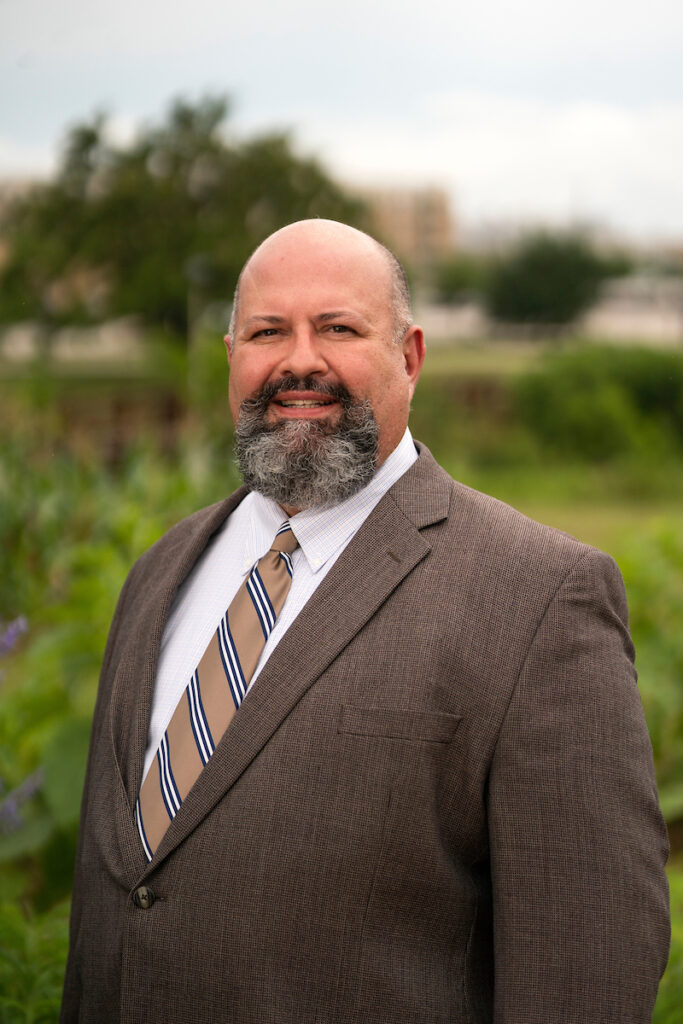Roel Lopez recipient of 2024 Conservation Trailblazer Award
Award celebrates contributions to game and non-game wildlife conservation
Three decades of research, teaching and service advancing the field of wildlife conservation were celebrated as Roel Lopez, Ph.D., head of the Texas A&M College of Agriculture and Life Sciences Department of Rangeland, Wildlife and Fisheries Management and director of the Texas A&M Natural Resources Institute, received the Conservation Trailblazer Award from the Dallas Safari Club during their annual convention held earlier this month.

The award celebrates the significant contributions of wildlife professionals to game and non-game wildlife conservation, including wildlife and habitat management, applied research and policy.
“Dr. Lopez has dedicated his career to advancing wildlife conservation not only through research and educational outreach, but through the development of the next generation of conservation leaders,” said Jeffrey W. Savell, Ph.D., vice chancellor and dean for Agriculture and Life Sciences. “His actions in and outside of the classroom seamlessly integrate research, leadership and service, enabling our College to produce tomorrow’s leaders and advance natural resource stewardship.”
A member of the International Union for Conservation of Nature, the Dallas Safari Club seeks to ensure wildlife conservation through public engagement, education and advocacy for well-regulated hunting and sustainable use.
A legacy of impact
Endangered and fragmented wildlife populations, military land sustainability, and rural land trends and demographics are the crux of Lopez’s expertise.
“For decades, Dr. Lopez has been a nationally recognized leader in wildlife conservation,” said Corey Mason, chief executive officer of the Dallas Safari Club and Dallas Safari Club Foundation. “He has led many state and national conservation organizations and has a unique ability to bring people together to advance wildlife conservation.”
Mason added this leadership also extends into the classroom, where Lopez’s investment in student development transcends course curriculum to impact students throughout their careers.
Lopez was named head of the Texas A&M Institute of Renewable Natural Resources, now the Texas A&M Natural Resources Institute, in 2012, in addition to being a wildlife and fisheries science professor in the department.
Throughout his career, he has secured more than 200 research grants totaling more than $60 million, published 153 peer-reviewed journal articles, as well as 22 book chapters and three books. In addition to his research, Lopez has served as the committee chair or co-chair for 122 graduate students and continues to teach multiple undergraduate courses in the department.
“When I learned that I was the recipient of this award, I was surprised, humbled and honored,” Lopez said. “This is certainly not an award just for myself, but for all the people I work with across Texas A&M.”
Facilitating innovative teaching and research
Lopez was named the head of the Department of Rangeland, Wildlife and Fisheries Management in 2021 and has strategically worked to build an interdisciplinary program at the nexus of research, teaching and outreach.
“My goal is to empower our faculty and staff to provide students with an exceptional education through innovative coursework, research, leadership and service, and field-based opportunities,” Lopez said. “The experiences we offer must translate to real-world resource management and conservation applications.”
Thanks to this guiding principle, students within the department can expect an educational experience extending far beyond the confines of a traditional classroom.
For example, all students must complete a rigorous, three-week summer field course to learn and implement land management techniques, perform field measurements, engage in conservation planning and more.
Last spring, the department also launched a unique course enabling students to explore the role of hunting in wildlife conservation.
Taught by James Cathey, Ph.D., professor in the Department of Rangeland, Wildlife and Fisheries Management, the Conservation Principles and the Role of Hunting course facilitates outdoor experiences while also providing critical insight into historic and modern wildlife policies, contemporary conservation actions and funding sources, and the linkage to hunting.
“We are firm believers that not all classrooms have four walls,” Lopez said.
Lopez said faculty-mentored undergraduate research is also a priority, with multiple projects taking place at department-managed properties and research facilities across the state.
“We take our mission of preparing the next generation of natural resource stewards very seriously,” Lopez said. “Thanks to the department’s outstanding support network comprised of internationally recognized faculty members and conservation leaders, we will continue to refine and strengthen the department’s strategic mission to best serve our students and our natural resources.”
Ongoing recognition
Lopez earned his bachelor’s degree in forestry from Stephen F. Austin State University and his master’s and doctorate in wildlife and fisheries sciences from Texas A&M University.
He holds myriad awards, including the Texas A&M Regents Fellow Service Award, the Texas A&M AgriLife Vice Chancellor’s Award in Excellence, the Texas Wildlife Association’s Sam Beasom Conservation Leader Award, and the Texas Chapter of The Wildlife Society Outstanding Educator Award and, most recently, Honorary Lifetime Membership, among others.
“Any recognition I have received can be attributed to the outstanding support of colleagues I have had the fortune to work with throughout my career,” Lopez said. “Through our shared mission of resource stewardship and empowering the next generation of natural resource professionals, we can achieve great things.”


